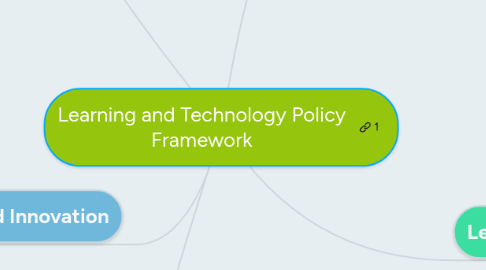
1. Research and Innovation
1.1. Teachers, administrators and other education professionals:
1.1.1. Stay current with educational technology research
1.1.2. Participate in and apply research to learning and teaching
1.1.3. Use data systems and evidence-based reasoning to monitor and support personalized, student- centred learning
1.2. In Alberta’s education system:
1.2.1. Educational technology research is supported
1.2.2. Technology investments are targeted to areas of greatest effectiveness and need
1.2.3. Decision-making related to technology is informed by data and research
2. Professional Learning
2.1. Digitally confident teachers, administrators and other education professionals:
2.1.1. Are well prepared to use technology and digital resources innovatively and effectively for learning, teaching, leadership and administration
2.1.2. Use technology and research to design personalized, authentic and student-centred learning opportunities to meet the diverse needs and interests of all students
2.1.3. Engage in professional growth opportunities that are broadened and diversified through technology, social media and communities of practice
3. Access, Infrastructure and Digital Learning Environments
3.1. Students, teachers, administrators and other education professionals have support for and equitable access to:
3.1.1. Devices and peripherals
3.1.2. Digital learning environments
3.1.3. Facilities designed to maximize learning with technology
3.2. In Alberta’s education system:
3.2.1. Reliable infrastructures exist that support safe, secure, efficient, interoperable and sustainable networks
4. Student Centred Learning
4.1. Students use technology, online learning and digital learning to:
4.1.1. Discover, develop and apply competencies
4.1.2. Access, share and create knowledge
4.1.3. Develop and apply digital citizenship and technological skills
4.1.4. Demonstrate what they know and are able to do through effectively using a range of resources and media
4.1.5. Monitor their learning progress and inform decisions through the use of data and evidence- based reasoning
5. Leadership
5.1. Education leaders at all levels champion effective and innovative uses of technology for all schools. As a result:
5.1.1. Government and school authorities have clarity and coherence in the policies and procedures that govern educational and administrative uses of technology in all schools
5.1.2. Teachers, administrators and other education professionals use technology innovatively, effectively and efficiently
5.1.3. Economies of scale that achieve cost effectiveness and efficiencies in educational technology are realized
5.1.4. Up-to-date guidelines and standards on uses of technology inform school authority education plans
